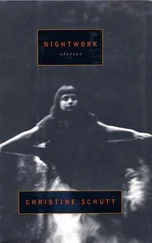To see the girls moving broadly down the avenue laughing was to see girls in love, or that was what Wendell Bliss (father to the handsome Will) thought walking on the other side of Park with Marion's dog, Peanut. The girls looked familiar in their black short coats, black jeans, tottering boots. Where were they off to? Where were they all, the girls, all those girls Wendell Bliss had seen with his son at their apartment? Abundant hair and skinny feet. Where were they? And the girls he hadn't met who stayed at home on Saturdays. Were they baking cookies? That is what girls at home used to do, but this was New York. In New York a lot of girls found their way into his son's room. Marion Bliss asked that Will's door be kept open, but the door to his son's room was often shut. Home from boarding school, Will often squeaked past his parents' bedroom door in the predawn blue, and Will was not alone. Wendell Bliss never told his wife. He might tell her now if she were here or tell her how surprised he was to be old, but Marion was not here; she was still with her mother in Florida. She was in Florida and Will was on his way to Florida and he would follow without Peanut. ("Marion, the dog will upset your mother.") Marion's mother. This would surely be the last Thanksgiving in Palm Beach. Marion's mother had cancer. Cancer. Cancer everywhere you looked. Poor little girl, the one his son knew, the one in the play. There wasn't any question where that girl was tonight so close to Thanksgiving.
Marlene
Marlene Kovack was in Miss F's math class and going over the last test. Marlene had failed. Was she then a dummy? (Well, maybe in math.) But was she the dumbest in the dummy class? Was Marlene really a C student, or was she a C because of a ripe, damp quality she had? The pocket of skin beneath her eyes, a kind of blister, was discolored and sweaty as if the school air were tropical, and she, overheated from the exertion of changing classrooms and doodling in class. Marlene might not be a C if she were pretty and thin. She wouldn't be a C if she paid attention, surely, but Marlene stood up and walked out of Miss F's class — Marlene never asked permission but took advantage of her teacher's size and wore a certain malevolent expression she knew was a threat — and she dawdled in the hall. By the time Marlene returned, the problem was solved; the class was nearly over.
Now Marlene was lingering near the college office again, yawning in the face of yet another free and knocking around the hallway, showing herself to Mrs. Quirk. She asked the college counselor, "Mrs. Quirk, do you know who I am?"
Mrs. Quirk, a tall woman, tailored pants, pretended indignation. "Of course, I do," she said. "Aren't you…" and she laughed. "I'm kidding, Marlene."
Lisa Van de Ven went into Mrs. Quirk's office. Marlene had noticed Lisa was often stopping by Mrs. Quirk's office. Probably no teacher, Marlene thought, really knew who Lisa was, but Marlene did. She knew Lisa was not the nice girl she played at being with the teachers. Does Marlene own a brush, or did she forget how to wash her hair? Marlene remembered the Lisa Van de Ven of eighth grade, and that Lisa had not really changed.
Does she own a brush?
She always copies us.
Let's not befriends with her anymore.
She's overweight now. Sucks for her.
There's always one girl in your class that you hate.
Alex and Suki
"It's not as if we're the only ones," Suki said, but Mrs. Dembroski passed over this remark and wanted to know instead how Alex and Suki, both of whom lived within walking distance of the school, how they could be late for English, senior English, in this most important semester. An unexcused absence was a zero for the day in Mr. O'Brien's class, wasn't it? Didn't they know that?
"We know. We know, we know, we know. We're sorry. We're stressed. We can't keep up. Mr. O'Brien assigns so much. He expects us to remember everything."
"Okay. For now, it's just detention. Admissions needs help. After school on Friday, you can stuff envelopes."
The sound that whistled out of Alex as she left Mrs. Dembroski's office conveyed all her feelings, but did Dembroski really think stuffing envelopes was going to keep her from cutting O'Brien's first-period Monday class?
"I will never get into Brown," Suki said.
"You make me sick. There are practically buildings named after you there."
Siddons
Anna Mazur said, "Oh, to lose all that beautiful hair!" Anna's own sparse colorless hair sparked when she so much as touched it.
"Hair grows back," Miss Hodd said.
"Not that color," Anna Mazur said.
Miss Hodd said, "I let the nines write after morning meeting today. Nobody wanted to do grammar. Listen to what Camilla Berkey wrote: 'Helplessness scrubs us all clean of any hope we had of doing something, but the doctors are still dirty. They must not be touched with the sponge. No, they must not.'"
Mothers
Mr. Dell, who was not at the coffee, was mentioned by Mrs. Van de Ven as reading to his daughter. They had just started Mansfield Park.
And how did Mrs. Van de Ven know this? Mrs. Morton wondered.
"I asked," Mrs. Van de Ven replied.
The gathered fluttered and some of the mothers looked sad, but Mrs. Morton said, "That's Fanny Price, isn't it? It's a most unfortunate name." Mrs. Morton's deep, druggy, slow voice made several of the mothers laugh. The sound of Mrs. Morton was funny, as was the fact of how rich she was and well-read.
Mrs. Cohen took Mrs. Van de Ven aside and spoke softly, " Think of it this way: When Nanda Morton wakes up each morning, she has made more money than most of us will make in a year." Mrs. Cohen said, "And you know what that means, don't you?"
"I know what that means," Mrs. Van de Ven said. "It means Suki Morton is going to Brown."
"Oh please!" said loudly and in exasperation from another part of the room.
Theta Kovack had heard it all before and had juggled to come in late to work for this acidic coffee and reckless talk.
"Look at them, a class of forty girls," said Mrs. Quirk, the college adviser, "and all of them will find a college. The job is to make the right fit." Mrs. Quirk said it was important to encourage daughters to finish their essays before Christmas break!
Mrs. Saperstein and Mrs. Song wore wise, relieved expressions as their daughters had applied for early admission. These mothers didn't have to worry about essays anymore. "Thank god!" was what they said.
That poor Astra Dell. She was losing all that hair now, wasn't she? How, Theta Kovack wondered, had Astra Dell entered the conversation happening just behind her; but the girl had, thanks to Mrs. Van de Ven, who seemed absorbed by the subjects of Astra Dell and the girls making themselves sick at Norris-Willet.
CHF
Car pushed and smoothed and rearranged the food; she made patterns.
"Look, Carlotta, if you're not going to eat it—" Mrs. Forestal began, but all the air she had to argue with hissed out of her, and she sat quietly, seeming very small and vacant at the other end of the table.
Mothers
What were other people drinking over the Thanksgiving weekend? Miss Wilkes was drinking amber ale, and Lisa Van de Ven took a sip. ("I shouldn't but how else can I get inspired to write my essay?") Alex and Suki were drinking skim-milk lattes. Mrs. Van de Ven ordered pinot grigio for lunch with Mr. Dell. "He looks so thin!" she told her husband at the Post House for dinner. She explained that the doctor was willing to take a risk, "a combination of surgery, internal radiation, external radiation, a couple of chemo…," but Mr. Van de Ven cut her off. They were eating, for heaven's sake, weren't they? "You may be," she said, "but I am drinking."
Читать дальше












